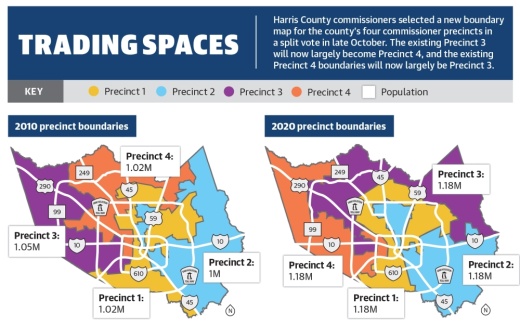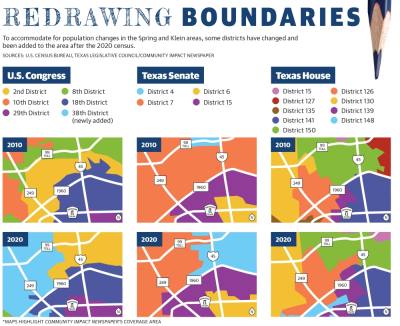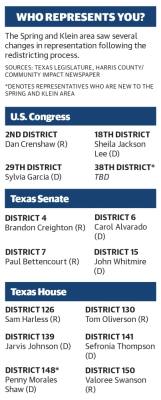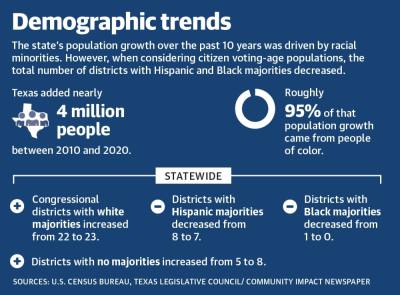The Texas Legislature wrapped up redistricting for the state in October. After every decennial census, states are required to redraw the boundaries of representation to accommodate for population changes. Texas, which grew about 16% in the past 10 years, according to the U.S. Census Bureau, added two seats in the U.S. House of Representatives,
including the 38th District, which covers much of the western portion of Spring that had been covered by U.S. Rep. Michael McCaul, R-Houston.
Redistricting at the county level could also result in new local representation. In a 3-2 vote, Harris County commissioners selected a new boundary map for the county’s four commissioner precincts Oct. 28. This plan has drawn criticism from the court’s two Republican commissioners: Tom Ramsey of Precinct 3 and Jack Cagle of Precinct 4. Both voted against the proposal and have joined a lawsuit against the county over the redistricting results.
In a Nov. 9 Commissioners Court meeting, Cagle noted the vote on new maps has historically been unanimous, and both commissioners brought up the drastic “flip” of their precincts. Much of Precinct 3 is now considered Precinct 4 and vice versa.
“I don’t think there’s ever been a redistricting that’s moved 2.3 million people,” Ramsey said.
County commissioner precincts
For the past decade, the Spring and Klein areas were contained within Harris County Precinct 4. Now, the same areas will fall in Precinct 3, while Precinct 4 will start west of Tomball and northwest of the Grand Parkway, extending south past FM 529.
The U.S. Constitution states commissioners court precincts should not deviate from 10% more or less than an ideal population size, which for Harris County was 1.18 million.
“The map we passed here today stands in stark contrast to the radical gerrymandering passed in Austin, which was designed ... at the expense of fair representation for all Texans,” said Precinct 1 Commissioner Rodney Ellis, who proposed the approved map.
County officials said the deadline to transition responsibility is not until Jan. 1, 2023, but commissioners agreed Nov. 9 to complete the transition by March 31, 2022.
Bobby Lieb, president and CEO of the Houston Northwest Chamber of Commerce, said with the relationships formed over the last decade between Precinct 4 staff and Spring-area businesses and organizations, the transition to working with Precinct 3 will be difficult.
“We’re not saying [the transition] will be the end of the world, but it will be messy,” Lieb said.
Members of the Cherry Tree Republicans were upset at the news of the change, President Tina Riddle said, and are worried about the potential effects on parks and community programs. The local political group has about 150 members, all residing in northwest Harris County.
“Commissioner Jack Cagle always kept the parks pristine and safe, well lit, accessible,” Riddle said. “So [our members] are concerned about that, and they feel very disenfranchised because they voted for one person, and without their representation, they now have another commissioner.”
Requests for comment were made to several local Democratic political groups, but no responses were given as of press time.
Pending litigation
Cagle and Ramsey joined a lawsuit against the county Nov. 16, which alleges the new commissioners precinct map violates voters’ right to cast a ballot by forcing constituents in the new Precinct 4 to vote for a new commissioner in 2022 when Cagle’s term is up. Residents in the new Precinct 3 will not get to vote in a commissioners election for six years, Cagle said, should the lawsuit fail.
“You’ve now taken away the right to vote for [1.3] million people. ... There’s no greater voter suppression than taking away [residents’] vote,” Cagle said.
The lawsuit asks the Harris County District Court to draw an interim map for the 2022 commissioner elections while also applying for an injunction to block the Ellis map from taking effect. Emily Berman, a professor at the University of Houston Law Center, said the suit relied on a precedent in which state courts can listen to cases alleging excessive partisan gerrymandering.
According to Mark Jones, a political science professor at Rice University, gerrymandering is the practice of drawing political districts to benefit a political party, racial or ethnic group.
“Partisan gerrymandering is 100% constitutional. ... You can also draw districts that ... are designed to ensure that underrepresented minorities are able to elect candidates of their choice,” Jones said.
The type of gerrymandering that is illegal “would effectively hurt the ability of underrepresented minorities [and] cancel their choice,” Jones said.
A court hearing was held on whether to grant a temporary restraining order preventing Harris County from implementing the Ellis map Nov. 29, but the attempt was not successful, Cagle said. A hearing on the temporary injunction was slated for Dec. 17 as of press time, and Cagle said the goal is to get the lawsuit before the Texas Supreme court by early January.
U.S. congressional changes
The Legislature passed four bills—Senate bills 4, 6 and 7 and House Bill 1—on Oct. 19, which drew new district maps for the state Senate, U.S. Congress, State Board of Education and the state House of Representatives, respectively.
The new congressional maps created by the state’s redistricting process will result in the Spring and Klein area getting a new congressional representative: whoever is elected to the new 38th District that was added as a result of the state’s growth. According to the Texas Secretary of State, 11 candidates have filed to run for the new seat as of the Dec. 13 deadline.
However, the U.S. Department of Justice announced Dec. 6 that it is suing the state of Texas over maps created during the redistricting process. The lawsuit states the new maps disenfranchise Black and Latino voters through a process called “vote dilution,” which spreads voters of color through several districts to reduce their voting power. The complaint states that this violates Section 2 of the Voting Rights Act. Additionally, the complaint alleges that several districts were drawn with discriminatory intent through a rushed process that lacked expert and citizen input.
Gov. Greg Abbott signed these maps into law Oct. 25, and they will go into effect Jan. 18 with primary elections following in March.
Additionally, two congressional territories moved out of the Spring area—the 8th District, overseen by U.S. Rep. Kevin Brady, R-The Woodlands, who in April announced plans to retire, and McCaul’s 10th District.
State district changes
The Spring and Klein area did not see much change in its state legislative districts with 15% population growth since 2010. State Reps. Sam Harless, R-Spring; Valoree Swanson, R-Spring; and Tom Oliverson, R-Cypress, will continue to serve parts of the Spring community in addition to state Reps. Jarvis Johnson, D-Houston; and Senfronia Thompson, D-Houston.
“Despite contributing to 95% of the population growth in Texas, Republicans ensured that Hispanic and Black people were immensely underrepresented throughout the redistricting process,” Johnson said.
State Rep. Penny Morales Shaw, D-Houston, picked up a portion of the region previously covered by Harless. The new area stretches east and west of Hwy. 249 in between where the highway intersects FM 1960 and Beltway 8.
“For the most part, it is just shuffling population and massaging the numbers along voting precinct lines to accommodate something close to the desired number of population for each district,” Harless said.
Spring and Klein’s two state Senate districts—15 and 7, served by state Sens. John Whitmire, D-Houston, and Paul Bettencourt, R-Houston, respectively—saw slight tweaks, and District 4, run by State Sen. Brandon Creighton, R-Conroe, gained some of the central area formerly zoned to District 7.
Darcy Sprague contributed to this report.










